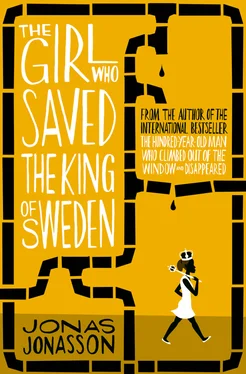The fact was that Nombeko had thought of something she’d read in one of the research director’s countless reports to the engineer. It wasn’t about antifreeze, but ethylene glycol. It said in the report that the researchers were experimenting with liquids that had a boiling point of over one hundred degrees Celsius in order to gain a few tenths of a second by raising the temperature at which critical mass would be reached. That was where the ethylene glycol came in. Didn’t antifreeze and ethylene glycol have similar properties?
If the research facility’s library was at its worst when it came to the latest news, it was at its best when it came to more general information. Such as confirmation that ethylene glycol and antifreeze were more than almost the same thing. They were the same thing.
Nombeko borrowed two of the keys in the engineer’s cupboard and sneaked down to the big garage and into the chemicals cupboard next to the electrical station. There she found a nearly full seven-gallon barrel of ethylene glycol. She poured a gallon into the bucket she’d brought along and returned to the girls.
‘Here you go – this is plenty, with some to spare,’ she said.
Nombeko and the girls decided that they would start by mixing a very mild dose into the dog food to see what would happen, and then they would increase the dose until all eight dogs were off sick without causing the guards to become suspicious.
Therefore the Chinese girls lowered the dose from two cups to one and three-quarters, upon Nombeko’s recommendation, but they made the mistake of letting the little sister take care of the dosing itself – that is, the one sister of the three who had been too little in the good old days. Thus she mixed in one and three-quarters cups of ethylene glycol per dog in the first, conservative round. Twelve hours later, all eight dogs were as dead as those in Parktown West a few years earlier. Furthermore, the guard commander’s food-sneaking cat was in a critical condition.
One characteristic of ethylene glycol is that it rapidly enters the bloodstream via the intestines. Then the liver turns it into glycolaldehyde, glycolic acid and oxalate. If there is enough of these, they take out the kidneys before affecting the lungs and heart. The direct cause of death in the eight dogs was cardiac arrest.
The immediate results of the youngest Chinese girl’s miscalculation were that the alarm was sounded, that the guards went on high alert, and that it was, of course, impossible for Nombeko to smuggle herself out in a rubbish bin.
It was only day two before the girls were called in for interrogation, but while they were sitting there and flatly denying involvement, the security personnel found a nearly empty bucket of ethylene glycol in the boot of one of the 250 workers’ cars. Nombeko had access to the garage, thanks to the engineer’s key cupboard, of course; the boot in question was the only one that happened to be unlocked, and she had to put the bucket somewhere. The owner of the car was a half-ethical sort of guy – on the one hand, he would never betray his country; on the other hand, as luck would have it, he had chosen that very day to swipe his department director’s briefcase and the money and chequebook it contained. This was found alongside the bucket, and when all was said and done, the man had been seized, interrogated, fired . . . and sentenced to six months in prison for theft, plus thirty-two years for an act of terror.
‘That was close,’ said the little sister once the three sisters were no longer suspects.
‘Shall we try again?’ the middle sister wondered.
‘But then we’d have to wait for them to get new dogs,’ said the big sister. ‘The old ones are all gone.’
Nombeko didn’t say anything. But she thought that her prospects for the future weren’t much brighter than those of the director’s cat, who had started having convulsions.
CHAPTER 4
On a Good Samaritan, a bicycle thief and a wife who smoked more and more
Since Henrietta’s money was gone, Ingmar had to do most of his hitchhiking from Nice back to Södertälje without eating. But in Malmö, the dirty, hungry junior post office clerk happened to meet a soldier of the Salvation Army who was on his way home after a long day in the service of the Lord. Ingmar asked if the soldier could spare a piece of bread.
The Salvationist immediately allowed himself to be governed by the spirit of love and compassion, so much so that Ingmar was allowed to come home with him.
Once there, he served mashed turnips with pork and then settled Ingmar in his bed; he himself would sleep on the floor before the stove. Ingmar yawned and said that he was impressed by the soldier’s friendliness. To this the soldier replied that the explanation for his actions was in the Bible, not least in the Gospel of Luke, where one could read about the Good Samaritan. The Salvationist asked Ingmar if he would mind if he read a few lines from the Holy Book.
‘Not at all,’ said Ingmar, ‘but read quietly because I need to sleep.’
And then he dozed off. He woke the next morning to the scent of something baking.
After breakfast he thanked the charitable soldier, said farewell, and then stole the soldier’s bicycle. As he pedalled away, he wondered whether it was the Bible that said something about necessity knowing no law. Ingmar wasn’t sure.
In any case, he sold the stolen goods in Lund and used the money to buy a train ticket all the way home.
Henrietta met him as he stepped through the door. Before she could open her mouth to welcome him home, he informed her that it was now time to make a child.
Henrietta did have a number of questions, not the least of which was why Ingmar suddenly wanted to get into bed without his damned box of American soldiers’ condoms in hand, but she wasn’t so stupid as to deny him. All she asked was that her husband shower first, because he smelled almost as bad as he looked.
The couple’s very first condom-free adventure lasted for four minutes. Then Ingmar was finished. But Henrietta was still pleased. Her beloved fool was home again and he had actually thrown the condoms into the bin before they went to bed. Could this mean that they were done with all the foolishness? And that they might be blessed with a little baby?
Fifteen hours later, Ingmar woke up again. He started by telling her that he had in fact made contact with the king down in Nice. Or the other way round, really. The king had made contact with him. Well, with his forehead. Using his cane.
‘Good heavens,’ said Henrietta.
Yes, you could say that again. But actually, Ingmar was thankful. The king had made him see clearly again. Made him realize that the monarchy was of the devil and must be eradicated.
‘Of the devil?’ said his startled wife.
‘And must be eradicated.’
But such a thing demanded both cunning and patience. And also that Ingmar and Henrietta had a child as part of the plan. His name would be Holger, incidentally.
‘Who?’ said Henrietta.
‘Our son, of course.’
Henrietta, who had spent her entire adult life silently longing for an Elsa, said that it could just as easily be a daughter, if they had a child at all. But then she was informed that she should stop being so negative. If she would instead serve Ingmar a little food, he promised to tell her how everything would be from now on.
So Henrietta did. She served pytt i panna with beetroot and eggs.
Between bites, Ingmar told her about his encounter with Gustaf V in greater detail. For the first but by no means last time he told her about ‘messenger boy’ and ‘scoundrel’. For the second but by no means last time he described the silver cane to the forehead.
Читать дальше












